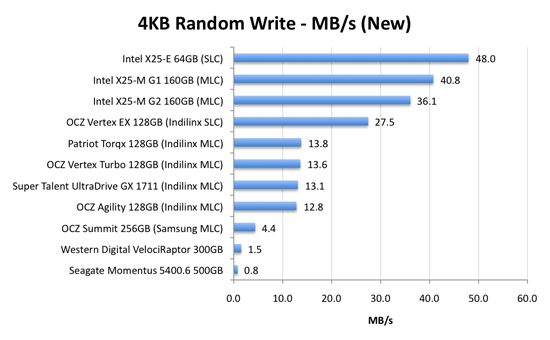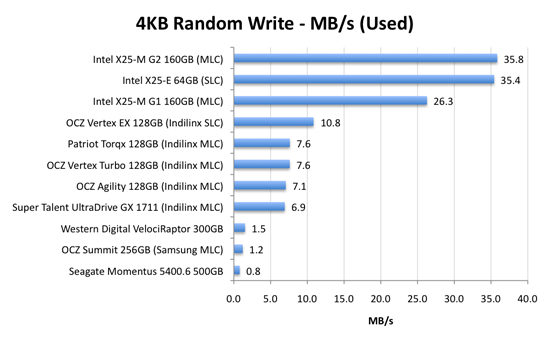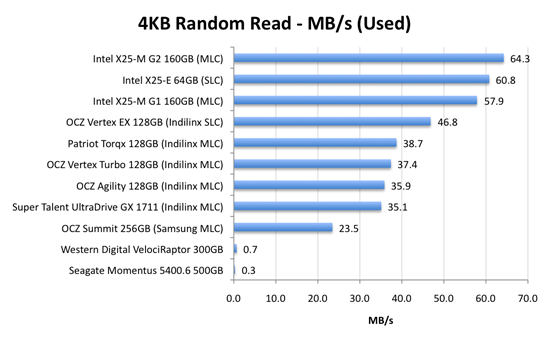The SSD Relapse: Understanding and Choosing the Best SSD
by Anand Lal Shimpi on August 30, 2009 12:00 AM EST- Posted in
- Storage
Random Read/Write Speed
This test writes 4KB in a completely random pattern over an 8GB space of the drive to simulate the sort of random writes that you'd see on an OS drive (even this is more stressful than a normal desktop user would see). I perform three concurrent IOs and run the test for 3 minutes. The results reported are in average MB/s over the entire time:

As we established in previous articles, the disk operations that feel the slowest are the random small file reads and writes. Both of which are easily handled by an SSD. A good friend of mine and former AnandTech Editor, Matthew Witheiler, asked me if he'd notice the performance improvement. I showed him the chart above.
He asked again if he'd notice. I said, emphatically, yes.

Now this is super interesting. Intel's X25-M G1 drops from 40.8MB/s when new down to 26.3MB/s in a well used state. Unfortunately for the G1, it will never get TRIM and will spend more time in the lower performance state over the life of the drive. But look at what happens with the X25-M G2: it drops from 36.1MB/s to 35.8MB/s - virtually no performance is lost. In fact, the G2 is so fast here that it outperforms the super expensive X25-E. Granted you don't get the lifespan of the X25-E and the SLC drive should perform better on more strenuous random write tests, but this is a major improvement.
The explanation? It actually boils down to the amount of memory on the drive. The X25-M G1 had 16MB of 166MHz SDRAM on-board, the G2 upped it to 32MB of slower 133MHz DRAM. Remember that Intel doesn't keep any user data in DRAM, it's only used for the remapping, defragmenting and tracking of all of the data being written to the drive. More DRAM means that the drive can now track more data, which means that even in the heaviest of random-write workloads you could toss at it on a normal desktop you will not actually lose any performance with the drive in a used state. And this is the drive Intel has decided to grant TRIM to.
The G2 is good.
The Indilinx drives do lose performance here. They drop from roughly 13MB/s down to 7MB/s. We're still talking ~5x the speed of a VelociRaptor, so there's no cause for alarm. But it's clear that even Indilinx's SLC drive can't match Intel's random write performance. And from what I hear, Intel's performance is only going to get better.
This is what the X25-M price premium gets you.

Bahahaha, look at the hard drive scores here: 0.7MB/s and 0.3MB/s? That's freakin' terrible! And that's why your system feels so slow when you start it up, there are a ton of concurrent random reads and writes happening all over the place which your hard drive crunches through at roughly 0.5MB/s. Even the Samsung based OCZ Summit manages a significant performance advantage here.
The Indilinx drives all cluster around the 30 - 40MB/s mark for random read performance, nothing to be ashamed of. The Intel drives kick it up a notch and give you roughly 60MB/s of random read performance. It's a noticeable improvement. As our application launch tests will show however, loading a single app on either an Indilinx or Intel drive will take about the same amount of time. It's only in the heavy multitasking and "seat of the pants" feel that you'll have a chance at feeling a difference.










295 Comments
View All Comments
Jedi2155 - Monday, August 31, 2009 - link
Anandtech has always been known for its in-depth analysis, you're just looking for a simple review list. I much prefer these detailed articles than just hearing the list of performance and simple recommendations that most people can write if provided the proper hardware.I love how Anand always writes excellent, very well detailed articles that are still SIMPLE to understand. A number of other sites may offer some similar levels of detailed but are sometimes a bit too difficult to comprehend without a background in the same field.
KommisMar - Sunday, April 4, 2010 - link
Anand,I read your long series of articles on SSDs today, and just wanted to say thanks for writing the most informative and interesting series of tech articles I've read in years. I've been avoiding SSDs because my first experience with one was horrible. The sustained transfer rates were no better than a traditional hard drive, and the system halting for several seconds on each random write operation was too much for me to stand.
I was so sick of the SSD coverage that I was reading on other websites because none of them seemed to answer my biggest question, which was "Which SSD won't bring my system to a screeching halt every time it needs to write a little data?"
Thanks for answering that question and explaining what to look for and what to avoid. It sounds like it's a good time for me to give SSDs another shot.
jamesy - Thursday, April 22, 2010 - link
That about sums it up: disappointment. Although this was a top-caliber SSD article, like i have come to love and expect out of anand, this article didn't make my buying decision any easier as all. In fact, it might have made it more complicated.I understand Intel, Indillinx, and Sandforce are good, but there are so many drives out there, and most suck. This article was amazing by most standards but the headline should be changed: removing the "Choosing the Best SSD."
Maybe "Choosing the right controller before sorting through a hundred drives" would be an appropriate replacement.
Do i still go with the intel 160 X-25m G2?
Do I get the addon Sata 6g card and get the C300?
Do i save the money, and get an indillinx drive? Is the extra money worth the Intel/C300 drive?
These are the main questions enthusiasts have, and while this article contained a great overview of the market in Q3 2009, SSD Tech has progressed dramatically. Only now, i think, are we getting to the point that we could publish a buying guide and have it last a few months.
I trust Anandtech, i just wish they would flat-out make a buying guide, assign points in different categories (points for sequential read/write, points for random read/write, points for real-life performance or perceived performance, points for reliability, and points for price.). Take all of these points, add em up, and make a table pls.
A few graphs can help, but the 200 included in each article is overwhelming, and does nothing to de-complicate or make me confindent in my purchase.
It's great to know how drives score, how they perform. But it's even important to know that you bought the right drive.
mudslinger - Monday, June 28, 2010 - link
This article is dated 8/30/2009!!!!It’s ancient history
Since then newer, faster SSD’s have been introduced to the market.
And their firmware have all been updated to address known past issues.
This article is completely irrelevant and should be taken down or updated.
I’m constantly amazed at how old trash info is left lingering about the web for search engines like Google to find. Just because Google lists an article doesn’t make it legit.
cklein - Monday, July 12, 2010 - link
Actually I am trying to find a reason to use SSD.1. Server Environment
No matter it's a webserver or a SQL server, I don't see a way we can use SSD. My SERVER comes with plenty of RAM 32G or 64G. The OS/start a little bit slow, but it's OK, since it never stop after it's started. And everything is loaded into RAM, no page file usage is needed. So, really why do we need SSD here to boost the OS start time or application start time?
For SQL server database, that's even worse. Let's say I have a 10GB SQL server database, and it grows to 50GB after a year. Can you image how many random writes, updates between the process? I am not quite sure this will wear off the SSD really quick.
2. For desktop / laptop, I can probably say, install the OS and applications on SSD, and leave everything on other drives? And even create page file on other drives? As I feel SSD is only good for readonly access. For frequent write, it may wear off pretty quick? I am doing development, I am not even sure I should save source code on SSD, as it compiles, builds, I am sure it writes a lot to SSD.
So over all, I don't see it fits in Server environment, but for desktop/laptop, maybe? even so, it's limited?
someone correct me if I am wrong?
TCQU - Thursday, July 29, 2010 - link
Hi peopleI'm up for getting a new Macbook pro with ssd.
BUT i heard somthing about, that the 128gb ssd, for apples machines, was made by samsung. I was ready to buy it, but now that i've heard that first of all "apples" ssd's is much slower that they others on the marked. Then i read this. So now i'm really confused.
What shoud i do?
buy apples macbook pro with 128gb ssd
or should i buy it without and replace it with an other ssd? thoughts? plzz help me out
thanks
Thomas
TCQU - Thursday, July 29, 2010 - link
Hi peopleI'm up for getting a new Macbook pro with ssd.
BUT i heard somthing about, that the 128gb ssd, for apples machines, was made by samsung. I was ready to buy it, but now that i've heard that first of all "apples" ssd's is much slower that they others on the marked. Then i read this. So now i'm really confused.
What shoud i do?
buy apples macbook pro with 128gb ssd
or should i buy it without and replace it with an other ssd? thoughts? plzz help me out
thanks
Thomas
marraco - Friday, August 13, 2010 - link
Why Sandforce controllers are ignored?I’m extremely disappointed with the compiler benchmark. Please test .NET (With lot of classes source files and dependencies). It seems like nothing speeds up compilation. No CPU, no memory, no SSD. It makes nonsense.
sylvm - Thursday, October 7, 2010 - link
I found this article of very good quality.I was looking for a similar article about express card SSDs using PCIe port, but found nothing about their performance for rewrite.
The best I found is this review http://www.pro-clockers.com/storage/192-wintec-fil... saying nothing about it.
Expresscard SSDs would allow good speed improvement/price compromise : buying a relatively small and cheap one for OS and softwares, while keeping the HDD for data.
Has anyone some info about it ?
Best regards,
Sylvain
paulgj - Saturday, October 9, 2010 - link
Well I was curious about the flash in my Agility 60GB so I opened it up and noted a different Intel part number - mine consisted of 8 x 29F64G08CAMDB chips whereas the pic above shows the 29F64G08FAMCI. I wonder what the difference is?-Paul